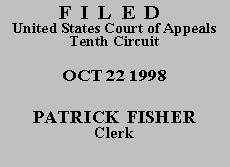

| RODNEY BLUE,
Petitioner-Appellant, v. KEN KLINGER; THE ATTORNEY GENERAL OF THE STATE OF OKLAHOMA, |
|
Rodney Blue, an Oklahoma state prisoner appearing pro se, seeks a certificate of appealability to appeal the district court's denial of his 28 U.S.C. § 2254 habeas petition. We grant a certificate of appealability, affirm in part, reverse in part, and remand for further proceedings.
Blue pleaded guilty in 1992 to burglary in the second degree and knowingly concealing stolen property, both after former convictions of two or more felonies, and was sentenced to twenty years' imprisonment. He has filed approximately five applications for post-conviction relief in state court. In his most recent application filed on June 12, 1997, he sought modification of his sentence pursuant to the provisions of the newly-enacted Oklahoma Truth in Sentencing Act. Blue argued failure to apply the Act retroactively would violate the Equal Protection Clause of the United States Constitution. In addition, he argued the Act violated the constitutional prohibition against ex post facto laws because it eliminated certain pre-parole and early release programs for which he might have been eligible in the future. His application was denied and the decision was affirmed on appeal to the Oklahoma Court of Criminal Appeals.
Dissatisfied with the decision, Blue filed his § 2254 petition on February 5, 1998, asserting the same arguments raised in his state application for post-conviction relief. Upon recommendation of the magistrate judge, the district court summarily dismissed the petition, concluding "the provisions of th[e] Act have not yet taken effect and certainly are not being applied to [Blue's] or any other conviction at this point in time. His challenge is premature." Record, Doc. 6 at 1. The district court also denied his request for a certificate of appealability.
Before Blue may proceed on appeal, he must obtain a certificate of appealability. We will not grant such a certificate absent a "substantial showing of the denial of a constitutional right." 28 U.S.C. § 2253(c)(2). To satisfy this standard, Blue does not have to demonstrate he would prevail on the merits. Rather, he must demonstrate the issues raised are debatable among jurists, that a court could resolve the issues differently, or that the questions deserve further proceedings. Barefoot v. Estelle, 463 U.S. 880, 893 n.4 (1983).
We have reviewed the record on appeal and agree that Blue has failed to make a substantial showing of the denial of a constitutional right to the extent he is claiming entitlement to resentencing under the Act. In Nestell v. Klinger, ___ F.3d ___, 1998 WL 544361 (10th Cir. 1998) (table), we recently affirmed the dismissal of another Oklahoma state prisoner's nearly identical habeas petition, holding (1) retroactivity of the sentencing matrix provisions of the Act is a question of Oklahoma state law not cognizable in a federal habeas petition; (2) there is no equal protection violation simply because a criminal defendant who commits a crime after the effective date of the Act is sentenced under the Act's sentencing matrix provisions; and (3) the Act does not violate the constitutional prohibition against ex post facto laws. These holdings are equally applicable in this case.
However, we conclude Blue has made a substantial showing of the denial of a constitutional right to the extent he is asserting the Act's elimination of pre-parole and early release programs violates the Ex Post Facto Clause. "An ex post facto law is 'any law which imposes a punishment for an act which was not punishable at the time it was committed; or imposes additional punishment to that then prescribed.'" Raymer v. Enright, 113 F.3d 172, 174 (10th Cir.) (quoting Weaver v. Graham, 450 U.S. 24, 28 (1981)), cert. denied, 118 S. Ct. 188 (1997). Here, Blue has asserted the Act effectively increased his punishment by eliminating the possibility of pre-parole or early release. If Blue can demonstrate he was entitled to pre-parole or early release under the pre-Act statutes, the Act's elimination of those programs would in fact constitute a violation of the Ex Post Facto Clause. See Lynce v. Mathis, 519 U.S. 433 (1997) (retroactive application of Florida statute eliminating gain-time credits "actually awarded" to petitioner "unquestionably disadvantaged the petitioner" in violation of Ex Post Facto Clause); Weaver, 450 U.S. at 35 (statute curtailing availability of gain-time awarded for inmate's good behavior postponed date when petitioner would become eligible for early release and thereby violated Ex Post Facto Clause). It is therefore necessary to remand this case to the district court for further consideration of whether the Act's elimination of pre-parole and early release programs, as applied to Blue, constitutes a violation of the Ex Post Facto Clause. See Raymer, 113 F.3d at 174 (courts must determine on case-by-case basis whether change in law sufficiently increases punishment to be considered ex post facto).
The request for a certificate of appealability is GRANTED. The judgment of the district court is AFFIRMED in part and REVERSED in part, and this matter is REMANDED to the district court for further proceedings consistent with this order. Appellant's "Motion for Leave to File Newly Discovered Evidence" filed July 22, 1998, is DENIED. The mandate shall issue forthwith.
Entered for the Court
Mary Beck Briscoe
Circuit Judge
*. This order and judgment is not binding precedent, except under the doctrines of law of the case, res judicata, and collateral estoppel. The court generally disfavors the citation of orders and judgments; nevertheless, an order and judgment may be cited under the terms and conditions of 10th Cir. R. 36.3.